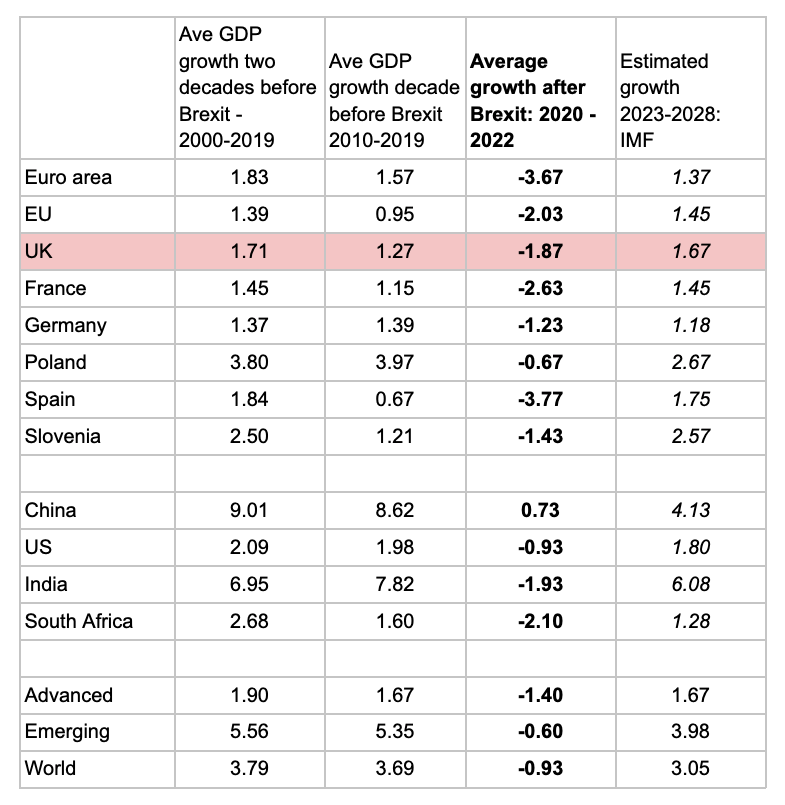BUSINESS REFLECTION
After the Bell: Arch-Brexiteer Farage thinks Brexit has failed — is he still wrong?

Turns out, in the three years following the UK’s departure from the bloc in early 2020, the UK’s economy contracted by 1.87% on average, which was a smaller decline than the EU, and a much smaller decline than the Eurozone.
On the day the UK voted to leave the EU seven years ago, a British friend of mine shocked me by saying he was elated at the decision. Just getting free of all those Brussels mandarins would be worth it, he argued. I thought the decision was nuts. We argued in very familiar terms about the pros and cons, with only one way to resolve the argument: we took a bet.
The bet was simple: that the GDP growth of the UK would be lower than that of the EU in the three years following the UK’s actual exit. I honestly thought I had this in the bag. But I just lost the bet.
It’s an odd time to lose a bet like this because the arch-Brexiteer Nigel Farage has just pronounced that he thinks Brexit has failed. Furthermore, the most recent poll shows that almost two-thirds of Brits say the move has been more of a failure than a success. British public opinion has seen an enormous sea change.
From my point of view, the change of opinion was entirely predictable. But actually, it is not so much that Brits think Brexit was the wrong choice (although they do now by a small majority, if you can trust these polls), but that they think the Conservative government has handled the change badly.
The YouGov poll shows 58% of those who voted to leave the EU in 2016 now think the government is handling Britain’s exit from the bloc badly — a figure that rises to 83% among Remain voters.
But the surprising thing is that none of this sentiment is reflected in the numbers, and it is worth asking why that’s the case. It’s not that the UK has flourished following its departure from the EU; it’s just that the economic growth of both the UK and the EU has been a bit sluggish, the EU a bit more so than the UK. Not as sluggish as SA, of course, but that’s a different story.
One obvious reason is that the UK’s departure coincided with the coronavirus pandemic, but in a sense, the pandemic affected all European countries roughly equally.
Anyway, here are the numbers: they are drawn from the IMF’s records and included are its predictions for the next five years or so.
I had three reasons for thinking I had the bet in the bag. First, I thought even in the best circumstances, there was bound to be a short-term contraction in the UK as both sides got used to the new way of doing things. Second, I thought it would be very unlikely that the EU would give the UK a decent trade deal since its immediate incentive would be to demonstrate to other wavering countries (hello, France and Italy) that leaving would result in economic pain.
And third, my extensive knowledge of economics led me to believe that easing trade is naturally a boost for all the countries in any given economic bloc. Ergo, exiting would have the opposite effect.
Turns out, in the three years following the UK’s departure in early 2020, the UK’s economy contracted by 1.87% on average, which was a smaller decline than the EU, and a much smaller decline than the euro area. The euro area was growing faster than the UK before its exit, but the EU as a whole was growing more slowly. This was one of the reasons some Brits wanted to leave: they felt the EU was a failing institution and it was crazy to be part of it.
But no sooner had the UK left than the page turned: all of a sudden the broader EU started outperforming the core European countries. It’s also worth noting that although the UK marginally outperformed (a trend the IMF thinks will continue), the UK dream of joining the dynamism and growth of the US economy hasn’t materialised either. And that isn’t expected to change either.
There is one other point (partly because I like being a contrarian): I still think the EU is a fabulous project, a sentiment a huge number of people who live there don’t share. But I support it because I think the incorporation of smaller countries gives them an enormous boost, which is why there are so many countries that are still gagging to join. You can see this in the figures for a larger country, Poland, and a small country, Slovenia. The problem for the EU now is not the small newcomers, it’s the old big countries. (Hello, Germany, Spain and France).
Some of how all of this is turning out does make sense to me, but, you know, I’m absolutely guessing here. Germany’s current woes are in some ways related to the decline of China; Germany’s reliance on trade in physical goods has served the country fabulously over the past decades, but it does make it more vulnerable to the vagaries of fast-growing, big countries like China. The UK’s current surprising relative strength may likewise be related to its greater reliance on the service industry.
Perhaps the most surprising thing is that there are few real surprises: overall, the numbers are pretty close to their previous trends. That makes sense too, if you think about it; services are Europe’s predominant industry now, so trade flows aren’t the differentiator they once were. And all of Europe, the UK included, still does have one huge problem: declining population growth.
What surprises me about this is how little it is discussed within Europe. Maybe it’s just my imagination, or perhaps I just don’t speak enough of Europe’s main languages. SA is also stagnating, but it’s very central to the public debate. It seems to me the big, old countries of Europe, the UK included, are looking a bit wobbly, and therein lies some big problems for the future.
For all the agonies and arguments, for all the pages of newsprint expended on the subject, Brexit doesn’t seem to have made a noticeable difference, either positively or negatively, to either side. It’s weird. DM




















 Become an Insider
Become an Insider
A very interesting analysis as always, thank you. But I disagree with your point regarding population decline. The UK is experiencing unprecedentedly high levels of population growth through immigration. It is estimated that a new house needs to be built in the UK every 5 minutes to cope with the immigrant influx of recent years. This is one of the reasons Brexit is deemed a failure – one of the promises was that the UK would have better control of its borders. Germany’s population grew by over a million in 2022 (largely due to the influx of Ukrainian refugees). I assume you accept that a country’s population needs to stop growing at some point?
Most economists will tell you that a stable population is actually a hindrance to economic growth. GDP growth relies heavily on increased consumption. This can only happen if (1) the population grows, or (2) wages rise, potentially fueling inflation and decreasing company profits and tax from that, or (3) exports versus imports rise, relying on increased consumption in other countries, usually associated with population and income growth there, with the same associated problems, and a trade war thrown in for good measure.
The entire economic model is premised on infinite population growth.
Would that not depend on the type of population growth in the country? I would agree if the influx was of skilled people but an influx of refugees, particularly on the scale being experienced in the UK is only going to put immense pressure on the allocation of public (read taxpayers) funds and put tremendous strain on the services that should be benefitting the citizens of the country?
An inflow of skilled people is great for productivity, and disposable income will likely be higher than low skill immigrants (whether refugees or not). They would thus increase demand within the economy more on a per capita basis. That said, even refugees doing low-skill, low-pay work contribute to growth and demand (leading to more growth). They still need food, clothes, transport, and housing – increasing the incomes of shops, services, and landlords, who in turn have more to spend on other things.
There is also a tax implication. Higher skilled individuals are generally older and have less of their working lives until retirement. They pay more into the tax coffers over a shorter time. Lower skilled immigrants pay less (even if it’s just sales and council tax) but contribute over a longer span because they are generally younger. They are usually healthier due to younger age too, relying less on government medical, so they tend to be net contributors.
I think there are two big factors that have affected growth in the EU and UK differently since Brexit. The first is differing policy responses to Covid-19. Leaving aside public health cost/benefit arguments, the UK response was less economically devastating than most EU countries. This was not a “Brexit benefit” because individual EU countries chose their own responses.
The second is Europe’s heavy dependence on Russian fossil fuels and the painful adjustments made necessary by the invasion of Ukraine. Energy underpins economic growth. Germany, the EU’s economic behemoth, was almost entirely dependent for its industries. Other countries suffered to varying degrees.
Neither of these factors are related to Brexit. Therefore, the better GDP numbers for the UK than the EU have no relation to Brexit effects. Strip out these two factors and I suspect you would have won your bet.
Tim, thoughtful article, thank-you.
However, I find Daily Maverick’s continued bias against Brexit baffling.
1. Brexit took place after mutliple democratic votes. Is DM saying a democratic vote is good/valid only if the “right” answer is reached? Judged by who and with what overriding authority?
2. Are you aware that prior to Brexit, only some 5% of UK businesses actually traded with the EU? Mostly huge multinationals trading under multiple regulatory and tariff regimes all over the world. Most declaring record profits in recent years, enabled by a continuingfree trade deal in place today. Corroborated by the revised UK GDP figures incidentally.
3. So why should the UK have poured tens of billions into EU coffers for the benefit of this 5%, the multinationals, special interest groups, when it is running huge deficits, has crumbling infrastructure etc? Why should it give up its democratic rights and sovereignty for the same?
4. The EU accounts haven’t been signed off by their auditors in decades. Whistleblowers protesting at the fraud and corruption in the accounts are jailed or severely threatened. On top of this EU MEPs have immunity against a wide variety of crimes.
I support and applaud DM’s efforts to promote democracy and transparency amongst other many other good things, in the RSA.
But your oft stated opposition to Brexit, criticism and so on, demonatrates a worrying ignorance and willingness to turn a blind eye to inconvenient truths in favour of EU propoganda.